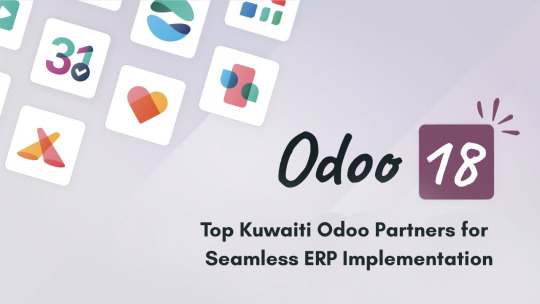#Custom HR Software Development
Explore tagged Tumblr posts
Text
How AI and Automation Enhance Custom HR Software Development

AI and automation enhance custom HR software development by streamlining recruitment, onboarding, and employee management through intelligent workflows. They enable predictive analytics, reduce manual tasks, and improve decision-making for HR Software Development Companies.
1 note
·
View note
Text
How Custom HR Software Development Improves Employee Engagement

Custom HR Software Development plays a vital role in improving employee engagement by delivering personalized, intuitive, and streamlined HR experiences. It empowers employees with self-service tools, real-time feedback systems, and AI-driven support to stay connected and motivated. By aligning HR technology with company culture and employee needs, businesses can foster deeper engagement and long-term retention.
0 notes
Text
Top Kuwaiti Odoo Partners for Seamless ERP Implementation

If you're running a growing business in Kuwait and looking to streamline operations, you’ve likely come across Odoo ERP. And for good reason, Odoo is one of the most flexible, scalable, and cost-effective ERP software solutions on the market today. But here’s the catch: choosing the right Odoo partner in Kuwait can make or break your ERP success.
In this blog, we’ll walk you through the top Odoo development companies in Kuwait, known for delivering seamless, customized ERP implementations, more importantly, helping businesses unlock their full digital potential.
Why Odoo ERP Is the Right Fit for Kuwaiti Enterprises
Odoo is more than just ERP software-it's a fully integrated suite of applications that adapts to your business, no matter the size or industry. From automating routine tasks to streamlining complex workflows, Odoo enables faster decision-making and better collaboration across departments.
In Kuwait’s diverse economy-from retail and logistics to oil & gas and finance-Odoo’s flexibility is a game-changer. And when paired with a skilled Odoo partner in Kuwait, it can drastically reduce costs, boost productivity, and deliver measurable ROI.
What to Look for in an Odoo Partner in Kuwait
Selecting the right Odoo expert goes beyond checking credentials. Consider these essential qualities:
Hands-on experience with Odoo module development and customization
Proven record in Odoo ERP implementation and support
Knowledge of local regulations and business practices in Kuwait
Strong communication and post-deployment training
Ability to deliver cloud-based Odoo solutions
Top 5 Odoo Partners in Kuwait to Consider
1. Centrix Plus
Centrix Plus is widely regarded as a leading Odoo service provider in Kuwait, offering tailored ERP solutions for businesses across various industries. They specialize in Odoo customization, third-party integrations, and cloud-based ERP deployment, all backed by reliable local support.
2. ERPify
ERPify is known for making ERP adoption easy for SMEs. Their end-to-end services include Odoo consulting, implementation, and module enhancements. With a focus on user training and long-term support, ERPify ensures businesses see continued success post-launch.
3. Gulf ERP Solutions
Gulf ERP Solutions is a strong choice for large enterprises seeking complex Odoo implementations. Their team delivers well-structured ERP systems tailored to the needs of industries such as retail, supply chain, and manufacturing in Kuwait.
4. TechnoSoft Kuwait
TechnoSoft stands out with its expertise in Odoo migration and system integration. Whether you're moving from another ERP or building a solution from scratch, their approach ensures minimal disruption and maximum performance.
5. Al-Murad IT
Al-Murad IT brings a consultative approach to Odoo deployment. Their team focuses on long-term support, scalability, and performance optimization-ideal for companies that want a dependable ERP partner for continuous growth.
Final Thoughts
Choosing an Odoo development company in Kuwait isn’t just about deploying software-it’s about building a system that supports your business vision. With the right partner, your ERP journey can become a powerful asset for growth and operational excellence.
Get Started with a Trusted Odoo Partner
At Centrix Plus, we help Kuwaiti businesses unlock their potential through smart, customized Odoo ERP solutions. Let us simplify your processes, enhance efficiency, and take your business to the next level.
Schedule Your Free Odoo Consultation Today →
#Custom Odoo Development Kuwait#Odoo Accounting Software Kuwait#Odoo Inventory Management Kuwait#Kuwait VAT Compliance Odoo#Odoo Cloud Hosting Kuwait#Odoo Training and Support Kuwait#Arabic Odoo ERP Kuwait#Odoo for SMEs in Kuwait#Odoo POS System Kuwait#Odoo HR Module Kuwait
0 notes
Text
Why Kuwaiti Businesses Are Choosing Odoo for Their ERP Needs

Kuwait’s economy is thriving, with businesses across industries like oil and gas, retail, logistics, and finance embracing digital transformation to stay competitive. In this fast-paced landscape, Enterprise Resource Planning (ERP) systems have become indispensable tools for growth. Among the solutions gaining traction, Odoo ERP is a favorite for Kuwaiti businesses.
But why? At Centrix Plus, Kuwait’s trusted partner for Odoo implementation and customization, we’ve witnessed firsthand how this open-source platform is revolutionizing local operations. Here’s why Kuwaiti companies are making the switch to Odoo.
1. Cost-Effective Flexibility for Growing Businesses
Kuwaiti SMEs and large enterprises alike prioritize solutions that deliver value without breaking the bank. Odoo’s modular structure allows businesses to start with essential apps (like accounting, inventory, or CRM) and scale up as needed. Unlike rigid, pre-packaged ERP systems, Odoo’s pay-as-you-grow model aligns perfectly with Kuwait’s dynamic market, where agility is key.
Centrix Plus Insight:We’ve helped Kuwaiti startups and conglomerates customize Odoo modules to fit their budgets, eliminating the need for costly overhauls down the line.
2. Local Compliance Made Simple
Kuwait’s regulatory environment demands precision, including VAT and financial reporting standards. Odoo’s localization features for the Middle East ensure compliance with Kuwaiti laws, from Arabic-language interfaces to automated tax calculations.
Did You Know?Centrix Plus offers Kuwait-specific Odoo customizations, such as Zakat reporting and integration with local banking systems, ensuring seamless adherence to regional requirements.
3. Scalability to Match Kuwait’s Ambitions
With Kuwait Vision 2035 driving economic diversification, businesses need ERP systems that grow with their goals. Odoo’s cloud-based infrastructure supports scalability, whether a company is expanding its warehouse in Shuwaikh or launching an e-commerce platform across the GCC.
Real-World Example:A Kuwaiti logistics firm partnered with Centrix Plus to implement Odoo’s fleet management and route optimization modules. Within months, they reduced delivery times by 30% and scaled operations to serve Saudi Arabia and the UAE.
4. Seamless Integration with Existing Tools
Many Kuwaiti businesses rely on legacy software or niche tools for industry-specific tasks. Odoo’s open-source API allows effortless integration with third-party systems, from government portals to custom POS setups in Kuwaiti retail stores.
Centrix Plus Advantage:Our developers specialize in bridging Odoo with Kuwait’s most-used platforms, ensuring minimal disruption during implementation.
5. Unmatched Customization for Kuwait’s Unique Needs
Kuwait’s market has distinct challenges, from managing seasonal demand during Ramadan to handling complex supply chains. Odoo’s flexible framework lets businesses tailor workflows to their exact needs.
Case in Point:A Kuwaiti construction company used Centrix Plus to build a custom Odoo module for project cost tracking, slashing budget overruns by 22% and improving stakeholder transparency.
Why Centrix Plus is Kuwait’s Go-To Odoo Partner
While Odoo’s benefits are clear, successful implementation requires local expertise. Here’s how Centrix Plus empowers Kuwaiti businesses:
In-Depth Regional Knowledge: We understand Kuwait’s business culture, regulations, and pain points.
24/7 Arabic/English Support: From Salmiya to Jahra, our team provides round-the-clock assistance.
Industry-Specific Solutions: Tailored Odoo setups for healthcare, trading, manufacturing, and more.
Post-Implementation Training: We ensure your team maximizes Odoo’s potential.
The Future of ERP in Kuwait Starts with Odoo
Kuwait’s businesses are no longer settling for one-size-fits-all ERP systems. With Odoo’s adaptability, cost efficiency, and localization strengths—paired with Centrix Plus’s expertise—companies are future-proofing their operations while staying rooted in Kuwait’s unique market demands.
Ready to Join the Odoo Revolution?
Contact Centrix Plus today to schedule a free consultation. Let us show you how Odoo can streamline your workflows, boost profitability, and position your business as a leader in Kuwait’s digital economy.
#Odoo ERP Kuwait#Best ERP Software Kuwait#Odoo Implementation Services Kuwait#Affordable ERP Solutions Kuwait#Top Odoo Partner Kuwait#Custom Odoo Development Kuwait#Odoo Accounting Software Kuwait#Odoo Inventory Management Kuwait#Kuwait VAT Compliance Odoo#Odoo Cloud Hosting Kuwait#Odoo Training and Support Kuwait#Arabic Odoo ERP Kuwait#Odoo for SMEs in Kuwait#Odoo POS System Kuwait#Odoo HR Module Kuwait
0 notes
Text
Best Software Development Company In Indore
KSVSoftTech is an IT service and IT consulting company based in Indore (India) that provides customized Software Development, Web Application Development, and Mobile Application Development Services. We have earned the pride of being one of the leading desktop & web-based software solution providers in Indore (India), we develop a software solution that helps our customers to outperform the competition and stay ahead in today’s competitive business environment. We firmly believe that business needs can be only met when technology is in sync with business processes.
#IT service and consulting company in Indore#Customized software solutions#Software development#Web application development#Mobile app development#ERP software providers in Indore#Affordable ERP software in Indore#HR software in Indore#Business management software in Indore
1 note
·
View note
Text
Top Custom Software Development Company in India | H.R. Software Solution

Choosing the Right Custom Software Development Company in India
In today’s fast-paced digital world, businesses need more than generic software solutions to stand out. Custom software development offers a way for companies to build tailored software solutions that address specific needs. As businesses in India grow, the demand for custom software development has surged. Finding the right custom software development company in India can make all the difference in transforming your ideas into a fully functional product.
H.R. Software Solution is one of the leading custom software development companies in India, providing innovative and customized solutions that are built to meet the unique needs of your business. With the latest Google Ranking algorithm updates, it’s more important than ever to ensure your digital solutions are optimized for visibility, functionality, and user experience.
Why Custom Software Development is Essential for Modern Businesses
Custom software development allows businesses to create applications tailored to their specific requirements, rather than depending on off-the-shelf solutions. Moreover, it offers flexibility that generic software simply cannot match. Therefore, here are some key reasons why custom software development is essential for modern businesses:
1. Tailored to Your Needs
Every business has unique requirements, and as a result, generic software often fails to address all those needs. However, custom software is developed specifically for your business processes, which means it’s designed to handle your workflows, improve efficiency, and solve your unique challenges. Therefore, opting for custom software ensures your business gets the tailored solutions it needs.
2. Scalable Solutions
Custom software development therefore allows your business to scale seamlessly. As a result, as your business grows, you can modify or expand the software to handle increased demand, new services, or added features without having to start from scratch. This way, your software evolves alongside your business.
3. Competitive Advantage
In a competitive market, having a custom solution gives you an edge over competitors using standard software. Custom software enables you to provide unique services, streamline operations, and enhance customer experience, all of which contribute to long-term business success.
4. Better Integration
Most businesses use a variety of software tools, and as a result, managing them can become complex. However, custom software allows for better integration with existing tools and systems, therefore ensuring seamless communication between platforms. In addition, it reduces the need for manual data entry, which means your processes become more efficient.
5. Enhanced Security
Custom software development ensures better security measures as the software is built specifically for your company’s needs. Unlike off-the-shelf software, which is used by many businesses and can be more vulnerable to cyberattacks, custom software offers unique security protocols designed specifically for your business.
What to Look for in a Custom Software Development Company in India
Choosing the right custom software development company is critical for the success of your project. However, with so many companies offering similar services, it can be difficult to know which one is the right fit for your business. Below are some key factors to consider:
1. Expertise in Custom Software Development
When choosing a custom software development company, it’s important to assess their expertise in delivering customized solutions. Look for a company that specializes in custom development rather than just offering generic software services. At H.R. Software Solution, we specialize in developing tailored software that meets specific business requirements.
2. Industry Experience
Experience in your industry can make a huge difference when it comes to understanding your business needs. A company with experience in your sector will have a better understanding of the challenges you face and the solutions required to overcome them. H.R. Software Solution has worked with a variety of industries, including finance, healthcare, education, and e-commerce, which gives us a deep understanding of industry-specific needs.
3. Agile Development Approach
A company that uses an agile development methodology is more likely to deliver successful projects. Agile development involves iterative processes, which allows for flexibility and improvements at every stage of development. This means you’ll get continuous updates and can provide feedback throughout the project. H.R. Software Solution uses the agile methodology to ensure that our clients receive high-quality solutions that can be adapted as their business evolves.
4. Focus on User Experience (UX)
User experience plays a critical role in the success of any software. Even the most advanced software won’t be effective if it’s difficult for users to navigate. Ensure that the custom software development company you choose focuses on creating intuitive, user-friendly interfaces. At H.R. Software Solution, we prioritize UX to ensure that your custom software is easy to use and provides value to your users.
5. Strong Communication and Support
Ongoing communication and support are vital throughout the software development process. Look for a company that offers clear, regular communication and ongoing support even after the project is completed. H.R. Software Solution is committed to maintaining strong communication with our clients from project inception through post-launch support.
6. Post-Development Support and Maintenance
Custom software requires regular updates and maintenance to stay functional and secure. Ensure that your chosen development company offers reliable post-development support to address any issues or improvements needed after the software is deployed.
The Role of Google’s Updated Algorithm in Software Development
Google’s algorithm updates don’t just affect your website’s ranking. They also play a crucial role in how your software development process should be structured. For instance, Google now prioritizes mobile-first indexing, core web vitals, and user experience. Understanding these factors is key to ensuring your custom software is not only functional but also optimized for search engines.
1. Mobile-First Indexing
Google now uses the mobile version of your website as the primary version for indexing and ranking. This means that your custom software needs to be optimized for mobile use from the very beginning. H.R. Software Solution ensures that all custom software we develop is mobile-friendly and optimized for mobile-first indexing.
2. Core Web Vitals
Google’s core web vitals focus on user experience, including page load time, interactivity, and visual stability. These factors are now critical ranking signals, and ensuring your custom software is fast, responsive, and visually stable is crucial for SEO success. We prioritize optimizing core web vitals to ensure your software performs well in terms of speed and usability.
3. Structured Data
Implementing structured data in your software allows search engines to better understand the content and context of your website or application. This leads to improved visibility in search engine results and higher click-through rates. At H.R. Software Solution, we ensure that the software we build is optimized for structured data, increasing your chances of being featured in rich snippets and other SERP features.
4. Security and SSL Certification
Google values security, and websites or applications with proper SSL certification rank better. We ensure that all software we develop is equipped with top-notch security features and SSL certification to keep both your data and your ranking secure.
Why Choose H.R. Software Solution for Custom Software Development in India
At H.R. Software Solution, we are committed to helping businesses succeed by providing custom software development solutions that are built to last. Here are just a few reasons why we stand out as the best custom software development company in India:
1. Proven Track Record
With years of experience in the industry, we have successfully delivered numerous custom software solutions to clients in a wide range of industries. Our team of expert developers uses cutting-edge technology and proven methodologies to ensure your software is built to the highest standards.
2. Client-Centric Approach
We believe in working closely with our clients to understand their business goals and challenges. This allows us to create custom solutions that not only meet your current needs but also grow with your business.
3. Comprehensive Services
From initial planning and design to development, testing, and deployment, we offer a full range of custom software development services. Whether you need a simple application or a complex enterprise solution, we have the expertise to deliver.
4. Skilled Team of Developers
Our team is made up of skilled software developers who are experienced in working with a wide range of technologies. This allows us to offer custom solutions using the most suitable technology stack for your business.
5. Competitive Pricing
We understand the importance of staying within budget; therefore, we offer competitive pricing for all our custom software development services. In addition, we provide high-quality solutions while ensuring they come without the hefty price tag. As a result, you get exceptional value for your investment.
Getting Started with H.R. Software Solution
If you’re ready to take your business to the next level with a custom software solution, look no further than H.R. Software Solution. As a trusted custom software development company in India, we are dedicated to providing innovative and reliable software that helps your business thrive in today’s competitive digital landscape.
Read More.....
Author Bio: Simi Gajala has been working in digital marketing since 2018, amassing 6 years of experience. Currently Working as a Digital Marketing Executive at H.R. Software Solution. Simi specializes in SEO, SMO, Google Ads, Meta Ads, and blogs & content writing, Boosting Brands, Increasing Visibility, And Enhancing Online Performance.
0 notes
Text
There are a lot of types of HR software, including Human Resource Information System (HRIS), Employee Performance Management Software, Employee Engagement Platforms, Absence Management Systems, etc. A system can even include all at once or be specifically developed for a particular procedure. One of these specifically created systems is what we will talk about in our article. To be precise, we want to dive deeper into the specifics of an Applicant Tracking System (ATS).
#hr management#hr software#human resources#applicant tracking system#outsourcing#software development#web development#staff augmentation#custom software development#it staff augmentation#custom software solutions#it staffing company#it staff offshoring#custom software
0 notes
Text
HR Tech Revolution: How Custom Software Can Supercharge Your People Operations?
youtube
Technology can be harnessed to empower people. Automation, digitalization, and AI are transforming the HR landscape. Personalized training, automated recruitment & processing of organizational conversation have supercharged the people operations in a company. AI-driven and custom solutions can unlock employee potential, reduce biases, and make the workplace more inclusive. This MarsDevs article will discuss the features of the HR tech revolution & how custom software can transform your operations.
0 notes
Note
Please tell us how to get into IT without a degree! I have an interview for a small tech company this week and I’m going in as admin but as things expand I can bootstrap into a better role and I’d really appreciate knowing what skills are likely to be crucial for making that pivot.
Absolutely!! You'd be in a great position to switch to IT, since as an admin, you'd already have some familiarity with the systems and with the workplace in general. Moving between roles is easier in a smaller workplace, too.
So, this is a semi-brief guide to getting an entry-level position, for someone with zero IT experience. That position is almost always going to be help desk. You've probably heard a lot of shit about help desk, but I've always enjoyed it.
So, here we go! How to get into IT for beginners!
The most important thing on your resume will be
✨~🌟Certifications!!🌟~✨
Studying for certs can teach you a lot, especially if you're entirely new to the field. But they're also really important for getting interviews. Lots of jobs will require a cert or degree, and even if you have 5 years of experience doing exactly what the job description is, without one of those the ATS will shunt your resume into a black hole and neither HR or the IT manager will see it.
First, I recommend getting the CompTIA A+. This will teach you the basics of how the parts of a computer work together - hardware, software, how networking works, how operating systems work, troubleshooting skills, etc. If you don't have a specific area of IT you're interested in, this is REQUIRED. Even if you do, I suggest you get this cert just to get your foot in the door.
I recommend the CompTIA certs in general. They'll give you a good baseline and look good on your resume. I only got the A+ and the Network+, so can't speak for the other exams, but they weren't too tough.
If you're more into development or cybersecurity, check out these roadmaps. You'll still benefit from working help desk while pursuing one of those career paths.
The next most important thing is
🔥🔥Customer service & soft skills🔥🔥
Sorry about that.
I was hired for my first ever IT role on the strength of my interview. I definitely wasn't the only candidate with an A+, but I was the only one who knew how to handle customers (aka end-users). Which is, basically, be polite, make the end-user feel listened to, and don't make them feel stupid. It is ASTOUNDING how many IT people can't do that. I've worked with so many IT people who couldn't hide their scorn or impatience when dealing with non-tech-savvy coworkers.
Please note that you don't need to be a social butterfly or even that socially adept. I'm autistic and learned all my social skills by rote (I literally have flowcharts for social interactions), and I was still exceptional by IT standards.
Third thing, which is more for you than for your resume (although it helps):
🎇Do your own projects🎇
This is both the most and least important thing you can do for your IT career. Least important because this will have the smallest impact on your resume. Most important because this will help you learn (and figure out if IT is actually what you want to do).
The certs and interview might get you a job, but when it comes to doing your job well, hands-on experience is absolutely essential. Here are a few ideas for the complete beginner. Resources linked at the bottom.
Start using the command line. This is called Terminal on Mac and Linux. Use it for things as simple as navigating through file directories, opening apps, testing your connection, that kind of thing. The goal is to get used to using the command line, because you will use it professionally.
Build your own PC. This may sound really intimidating, but I swear it's easy! This is going to be cheaper than buying a prebuilt tower or gaming PC, and you'll learn a ton in the bargain.
Repair old PCs. If you don't want to or can't afford to build your own PC, look for cheap computers on Craiglist, secondhand stores, or elsewhere. I know a lot of universities will sell old technology for cheap. Try to buy a few and make a functioning computer out of parts, or just get one so you can feel comfortable working in the guts of a PC.
Learn Powershell or shell scripting. If you're comfortable with the command line already or just want to jump in the deep end, use scripts to automate tasks on your PC. I found this harder to do for myself than for work, because I mostly use my computer for web browsing. However, there are tons of projects out there for you to try!
Play around with a Raspberry Pi. These are mini-computers ranging from $15-$150+ and are great to experiment with. I've made a media server and a Pi hole (network-wide ad blocking) which were both fun and not too tough. If you're into torrenting, try making a seedbox!
Install Linux on your primary computer. I know, I know - I'm one of those people. But seriously, nothing will teach you more quickly than having to compile drivers through the command line so your Bluetooth headphones will work. Warning: this gets really annoying if you just want your computer to work. Dual-booting is advised.
If this sounds intimidating, that's totally normal. It is intimidating! You're going to have to do a ton of troubleshooting and things will almost never work properly on your first few projects. That is part of the fun!
Resources
Resources I've tried and liked are marked with an asterisk*
Professor Messor's Free A+ Training Course*
PC Building Simulator 2 (video game)
How to build a PC (video)
PC Part Picker (website)*
CompTIA A+ courses on Udemy
50 Basic Windows Commands with Examples*
Mac Terminal Commands Cheat Sheet
Powershell in a Month of Lunches (video series)
Getting Started with Linux (tutorial)* Note: this site is my favorite Linux resource, I highly recommend it.
Getting Started with Raspberry Pi
Raspberry Pi Projects for Beginners
/r/ITCareerQuestions*
Ask A Manager (advice blog on workplace etiquette and more)*
Reddit is helpful for tech questions in general. I have some other resources that involve sailing the seas; feel free to DM me or send an ask I can answer privately.
Tips
DO NOT work at an MSP. That stands for Managed Service Provider, and it's basically an IT department which companies contract to provide tech services. I recommend staying away from them. It's way better to work in an IT department where the end users are your coworkers, not your customers.
DO NOT trust remote entry-level IT jobs. At entry level, part of your job is schlepping around hardware and fixing PCs. A fully-remote position will almost definitely be a call center.
DO write a cover letter. YMMV on this, but every employer I've had has mentioned my cover letter as a reason to hire me.
DO ask your employer to pay for your certs. This applies only to people who either plan to move into IT in the same company, or are already in IT but want more certs.
DO NOT work anywhere without at least one woman in the department. My litmus test is two women, actually, but YMMV. If there is no woman in the department in 2024, and the department is more than 5 people, there is a reason why no women work there.
DO have patience with yourself and keep an open mind! Maybe this is just me, but if I can't do something right the first time, or if I don't love it right away, I get very discouraged. Remember that making mistakes is part of the process, and that IT is a huge field which ranges from UX design to hardware repair. There are tons of directions to go once you've got a little experience!
Disclaimer: this is based on my experience in my area of the US. Things may be different elsewhere, esp. outside of the US.
I hope this is helpful! Let me know if you have more questions!
46 notes
·
View notes
Text

The Complete Guide to Outsourcing in 2025
What is Outsourcing and Why Does It Matter More Than Ever?
Outsourcing has become the backbone of modern business operations, transforming from a simple cost-cutting measure into a strategic necessity. But what exactly is outsourcing? At its core, outsourcing involves delegating specific business functions or processes to external service providers rather than handling them internally.
In today's hyper-competitive business landscape, outsourcing isn't just about saving money anymore. It's about survival, growth, and staying ahead of the curve. Companies that embrace smart outsourcing strategies are positioning themselves to thrive in an increasingly complex global marketplace.
Think of outsourcing as having a team of specialists at your fingertips without the overhead costs of hiring full-time employees. It's like having access to a Swiss Army knife of business solutions – you get the right tool for the right job, exactly when you need it.
The Evolution of Outsourcing: From Cost-Cutting to Strategic Partnership
The outsourcing industry has undergone a remarkable transformation over the past decade. Gone are the days when businesses outsourced solely to reduce labor costs. Today's outsourcing relationships are built on strategic partnerships that drive innovation, enhance capabilities, and create competitive advantages.
This evolution has been accelerated by technological advances, changing workforce expectations, and the need for businesses to remain agile in uncertain times. Companies are no longer just looking for cheaper alternatives – they're seeking partners who can bring expertise, innovation, and strategic value to their operations.
The shift from transactional relationships to strategic partnerships has redefined how businesses approach outsourcing. It's no longer about finding the lowest bidder; it's about finding the right partner who can contribute to your long-term success.
Types of Outsourcing Every Business Should Know
Business Process Outsourcing (BPO)
Business Process Outsourcing represents the most common form of outsourcing, involving the delegation of entire business processes to external providers. This includes customer service, human resources, accounting, and administrative functions. BPO allows companies to focus on their core competencies while ensuring that essential but non-core processes are handled efficiently by specialists.
The beauty of BPO lies in its versatility. Whether you're a startup looking to establish professional customer support or an enterprise seeking to streamline your HR operations, BPO can be tailored to meet your specific needs. It's like having a dedicated team working behind the scenes to keep your business running smoothly.
Information Technology Outsourcing (ITO)
IT outsourcing has become indispensable in our digital-first world. This involves delegating technology-related functions such as software development, system maintenance, cybersecurity, and technical support to specialized providers. With the rapid pace of technological change, many businesses find it more efficient to partner with IT experts rather than trying to keep up internally.
ITO offers access to cutting-edge technologies and expertise that might otherwise be prohibitively expensive or difficult to maintain in-house. It's particularly valuable for businesses that need to stay current with technology trends without investing heavily in internal IT infrastructure.
Knowledge Process Outsourcing (KPO)
Knowledge Process Outsourcing represents the higher end of the outsourcing spectrum, involving complex, knowledge-intensive processes that require specialized expertise. This includes research and development, financial analysis, legal services, and market research. KPO providers typically have advanced degrees and specialized knowledge in their respective fields.
What sets KPO apart is the level of intellectual input required. These aren't routine tasks that can be easily standardized – they require critical thinking, analysis, and domain expertise. It's like having access to a team of consultants and specialists without the consultant price tag.
Manufacturing Outsourcing
Manufacturing outsourcing involves delegating production processes to external manufacturers, often in countries with lower labor costs or specialized manufacturing capabilities. This type of outsourcing has been a cornerstone of global trade for decades and continues to evolve with changing economic conditions and technological advances.
Modern manufacturing outsourcing goes beyond simple cost reduction. Companies are increasingly looking for manufacturing partners who can provide innovation, quality improvements, and faster time-to-market. It's about finding the right balance between cost, quality, and capability.
Top Benefits of Outsourcing in 2025
Cost Reduction and Financial Flexibility
The financial benefits of outsourcing extend far beyond simple labor cost savings. By outsourcing non-core functions, businesses can convert fixed costs into variable costs, providing greater financial flexibility. This is particularly valuable in uncertain economic times when businesses need to maintain the ability to scale up or down quickly.
Outsourcing also eliminates the need for significant upfront investments in infrastructure, technology, and training. Instead of spending large amounts on setting up internal capabilities, businesses can access established expertise and infrastructure through their outsourcing partners. It's like renting a fully equipped office instead of buying and furnishing your own.
Access to Global Talent Pool
One of the most compelling advantages of outsourcing is access to a global talent pool. This is particularly valuable in today's tight labor market, where finding skilled professionals can be challenging and expensive. Outsourcing allows businesses to tap into expertise and skills that might not be available locally or might be prohibitively expensive to hire full-time.
This global access to talent also brings diversity of thought and experience to your business operations. Different perspectives and approaches can lead to innovative solutions and improved processes. It's like having a diverse team of experts working on your projects, each bringing their unique insights and experiences.
Enhanced Focus on Core Business Activities
By delegating non-core functions to outsourcing partners, businesses can redirect their internal resources and attention to activities that directly contribute to their competitive advantage. This enhanced focus often leads to improved performance in core areas and faster achievement of strategic objectives.
Think of it as decluttering your business operations. When you remove the distractions and delegate the routine tasks, you create space for innovation, strategic thinking, and activities that truly drive your business forward.
Scalability and Business Agility
Outsourcing provides unmatched scalability and agility. Whether you need to quickly scale up operations to meet increased demand or scale down during slower periods, outsourcing partners can adjust their services accordingly. This flexibility is crucial in today's dynamic business environment where change is the only constant.
This scalability extends beyond just capacity – it also includes capabilities. Need a new skill set for a specific project? Your outsourcing partner can quickly bring in the right expertise. It's like having an elastic workforce that can stretch and contract based on your needs.
Common Outsourcing Challenges and How to Overcome Them
Communication Barriers and Cultural Differences
Communication challenges remain one of the most significant obstacles in outsourcing relationships. Language barriers, time zone differences, and cultural misunderstandings can lead to project delays, quality issues, and frustration on both sides. However, these challenges are not insurmountable.
The key to overcoming communication barriers lies in establishing clear communication protocols from the start. This includes defining communication channels, setting regular meeting schedules that work across time zones, and creating detailed documentation standards. It's also important to invest time in understanding cultural differences and building relationships with your outsourcing team.
Quality Control Issues
Maintaining quality standards when work is performed by external providers can be challenging, especially when direct oversight is limited. Quality issues can arise from misunderstandings about requirements, different quality standards, or lack of proper oversight mechanisms.
Successful quality control in outsourcing requires establishing clear quality standards, implementing regular review processes, and creating feedback mechanisms. It's like setting up a quality assurance system that ensures consistency regardless of where the work is performed.
Data Security and Privacy Concerns
In an era of increasing cyber threats and strict data protection regulations, ensuring data security in outsourcing relationships is paramount. Businesses must carefully evaluate their outsourcing partners' security measures and ensure compliance with relevant regulations.
Addressing security concerns requires due diligence in partner selection, comprehensive security agreements, and ongoing monitoring of security practices. It's about creating multiple layers of protection to safeguard sensitive information throughout the outsourcing relationship.
Best Practices for Successful Outsourcing
Choosing the Right Outsourcing Partner
Selecting the right outsourcing partner is perhaps the most critical decision in your outsourcing journey. This goes beyond comparing costs – you need to evaluate expertise, cultural fit, communication capabilities, and long-term viability. The cheapest option is rarely the best option when it comes to outsourcing.
A thorough partner evaluation should include reviewing their track record, speaking with current and former clients, assessing their financial stability, and evaluating their ability to scale with your business. It's like choosing a business partner – you want someone who will contribute to your success, not just complete tasks.
Setting Clear Expectations and SLAs
Clear expectations and well-defined Service Level Agreements (SLAs) form the foundation of successful outsourcing relationships. These documents should specify deliverables, quality standards, timelines, communication requirements, and performance metrics. Ambiguity is the enemy of successful outsourcing.
Your SLAs should be specific, measurable, and realistic. They should also include provisions for handling changes, disputes, and performance issues. Think of SLAs as the rulebook for your outsourcing relationship – they keep everyone on the same page and provide a framework for addressing issues when they arise.
Building Strong Communication Channels
Effective communication is the lifeblood of successful outsourcing relationships. This means establishing regular communication rhythms, using appropriate communication tools, and ensuring that key stakeholders on both sides are kept informed. Communication shouldn't be an afterthought – it should be a planned and structured part of your outsourcing strategy.
Strong communication channels also include creating escalation paths for issues and ensuring that cultural and language barriers don't impede understanding. It's about creating an environment where open, honest communication is encouraged and facilitated.
Emerging Trends in Outsourcing for 2025
AI and Automation Integration
Artificial Intelligence and automation are revolutionizing the outsourcing industry. Outsourcing providers are increasingly integrating AI tools and automation technologies to improve efficiency, reduce errors, and provide better value to their clients. This trend is making outsourcing even more attractive as providers can deliver higher quality services at competitive prices.
The integration of AI doesn't mean job displacement – it means job enhancement. Human workers are being freed from routine, repetitive tasks to focus on higher-value activities that require creativity, critical thinking, and emotional intelligence. It's like having a super-powered team where humans and machines work together to achieve better results.
Nearshoring vs. Offshoring
The trend toward nearshoring – outsourcing to nearby countries rather than distant ones – is gaining momentum. This approach offers many of the cost benefits of traditional offshoring while reducing some of the challenges related to time zones, cultural differences, and communication barriers.
Nearshoring provides a middle ground between domestic outsourcing and traditional offshoring. It's particularly attractive for businesses that need close collaboration, frequent communication, or have concerns about data security and intellectual property protection.
Sustainability-Focused Outsourcing
Environmental and social sustainability are becoming increasingly important factors in outsourcing decisions. Businesses are looking for outsourcing partners who share their commitment to sustainable practices and social responsibility. This includes everything from environmental policies to fair labor practices.
Sustainability-focused outsourcing isn't just about doing good – it's also about risk management and brand protection. Consumers and stakeholders are increasingly holding businesses accountable for the practices of their partners and suppliers.
Industry-Specific Outsourcing Strategies
Healthcare Outsourcing
The healthcare industry has unique outsourcing needs and challenges. Medical billing, coding, transcription, and telemedicine support are commonly outsourced functions. However, healthcare outsourcing must navigate strict regulatory requirements, patient privacy concerns, and the critical nature of healthcare services.
Successful healthcare outsourcing requires partners who understand healthcare regulations, have appropriate certifications, and can maintain the highest standards of accuracy and confidentiality. It's about finding partners who can handle the complexity and responsibility that comes with healthcare services.
Financial Services Outsourcing
Financial services outsourcing covers a wide range of functions, from basic data entry and processing to complex financial analysis and risk management. The financial services industry has been an early adopter of outsourcing, but it also faces unique challenges related to regulatory compliance and security.
Financial services outsourcing requires partners who understand the regulatory environment, have robust security measures, and can maintain the accuracy and timeliness that financial services demand. Trust and reliability are paramount in this industry.
E-commerce and Retail Outsourcing
E-commerce and retail businesses often outsource customer service, order fulfillment, inventory management, and digital marketing functions. The seasonal nature of retail and the 24/7 demands of e-commerce make outsourcing particularly attractive for these industries.
E-commerce outsourcing partners need to understand the fast-paced nature of online retail, the importance of customer experience, and the need for scalability to handle peak seasons and promotional periods.
How to Create Your Outsourcing Strategy
Creating an effective outsourcing strategy starts with a thorough assessment of your current operations and identification of functions that are suitable for outsourcing. This involves analyzing each business process to determine its strategic importance, current performance, and potential for improvement through outsourcing.
Your outsourcing strategy should align with your overall business strategy and objectives. It's not about outsourcing everything you can – it's about outsourcing the right things in the right way to support your business goals. Consider factors such as cost, quality, risk, and strategic importance when making outsourcing decisions.
The strategy should also include a timeline for implementation, budget considerations, and success metrics. Remember that outsourcing is not a one-time decision – it's an ongoing process that requires regular review and adjustment.
Measuring Outsourcing Success: KPIs and Metrics
Measuring the success of your outsourcing initiatives requires establishing clear Key Performance Indicators (KPIs) and metrics from the beginning. These should cover various aspects of the outsourcing relationship, including cost savings, quality improvements, service levels, and customer satisfaction.
Financial metrics are important, but they shouldn't be the only measure of success. Quality metrics, such as error rates and customer satisfaction scores, provide insight into the value being delivered. Operational metrics, such as turnaround times and availability, measure the efficiency of the outsourcing arrangement.
Regular measurement and reporting create accountability and provide the information needed to make improvements. It's like having a dashboard that shows you how well your outsourcing relationships are performing and where adjustments might be needed.
The Future of Outsourcing: What to Expect Beyond 2025
The future of outsourcing will be shaped by continued technological advancement, changing workforce dynamics, and evolving business needs. We can expect to see more sophisticated integration of AI and automation, greater emphasis on outcomes rather than activities, and more collaborative partnerships between businesses and their outsourcing providers.
The line between internal and external resources will continue to blur as businesses adopt more flexible, hybrid approaches to workforce management. This will require new management skills, different contract structures, and more sophisticated performance measurement systems.
Businesses that want to succeed in this evolving landscape need to start preparing now by developing their outsourcing capabilities, building relationships with strategic partners, and creating the internal competencies needed to manage complex outsourcing relationships effectively.
Conclusion
Outsourcing in 2025 represents a strategic imperative rather than just a cost-saving tactic. The businesses that will thrive are those that approach outsourcing strategically, focus on building strong partnerships, and continuously adapt their outsourcing strategies to meet changing business needs.
Success in outsourcing requires careful planning, thorough partner selection, clear communication, and ongoing management. It's not a set-it-and-forget-it solution – it's an ongoing journey that requires attention, investment, and continuous improvement.
The future belongs to businesses that can effectively leverage global talent, technology, and expertise through strategic outsourcing relationships. By following the guidance in this comprehensive guide, you'll be well-positioned to harness the power of outsourcing to drive your business forward in 2025 and beyond.
Frequently Asked Questions (FAQs)
1. What types of business functions are best suited for outsourcing? Non-core functions that don't provide competitive advantage are typically best for outsourcing. This includes administrative tasks, customer support, IT services, accounting, and specialized projects requiring expertise not available internally. The key is identifying functions where external providers can deliver better value than internal resources.
2. How do I ensure data security when outsourcing sensitive business processes? Ensure data security by thoroughly vetting outsourcing partners' security measures, implementing comprehensive data protection agreements, establishing access controls, conducting regular security audits, and ensuring compliance with relevant data protection regulations. Choose partners with proven track records and appropriate security certifications.
3. What's the difference between nearshoring and offshoring, and which is better? Nearshoring involves outsourcing to nearby countries, while offshoring typically means outsourcing to distant countries with lower costs. Nearshoring offers better communication, similar time zones, and cultural alignment, while offshoring usually provides greater cost savings. The best choice depends on your specific needs, priorities, and risk tolerance.
4. How long does it typically take to see results from outsourcing? Results timeline varies depending on the complexity of outsourced functions and implementation approach. Simple processes might show results within 30-60 days, while complex transformations can take 6-12 months. Initial benefits often include cost savings, while efficiency improvements and quality enhancements typically develop over 3-6 months.
5. What are the most common mistakes businesses make when starting to outsource? Common mistakes include choosing providers based solely on cost, inadequate due diligence in partner selection, unclear expectations and contracts, poor communication planning, insufficient change management, and trying to outsource too much too quickly. Success requires careful planning, realistic expectations, and gradual implementation with proper oversight.
#digital marketing#digital#income online#online income#outsourcing#earn money online#earn money from home#earn money fast#earnings
5 notes
·
View notes
Text
EOR Companies in India: Why Brookspayroll is Your Ideal Partner for Global Hiring
As global hiring continues to evolve, Employer of Record (EOR) services have become a game-changer for companies looking to expand into new markets without the burden of setting up a legal entity. For businesses targeting the fast-growing Indian talent pool, choosing the right EOR company in India is crucial.
Among the leading names in this space, Brookspayroll stands out as one of the most trusted and efficient EOR companies in India, offering comprehensive solutions that are both scalable and compliant.
What is an EOR and Why Do You Need One in India?
An Employer of Record (EOR) is a third-party organization that legally employs workers on your behalf. This means the EOR handles:
Employment contracts and onboarding
Local labor law compliance
Payroll and tax management
Statutory benefits and insurance
Termination and exit procedures
For companies expanding into India, using an EOR enables you to hire top talent without establishing a local entity. It’s faster, cost-effective, and reduces compliance risks.
Brookspayroll: Among the Top EOR Companies in India
Brookspayroll is a leading provider of EOR services in India, known for its accuracy, efficiency, and personalized HR support. Here's why companies worldwide trust Brookspayroll:
✅ 100% Legal Compliance
Brookspayroll ensures your hiring and HR operations fully comply with Indian labor laws, including PF, ESI, gratuity, income tax, and more.
✅ Fast and Flexible Hiring
Hire Indian employees in a matter of days. Brookspayroll provides ready-to-go infrastructure for fast onboarding — no red tape, no delays.
✅ Customized EOR Solutions
From full-time employees to remote workers and contractors, Brookspayroll tailors its EOR services based on your specific needs.
✅ Transparent Pricing
No hidden charges or unexpected fees. Brookspayroll offers clear and competitive pricing for all EOR services.
✅ Local Expertise + Global Standards
Brookspayroll combines deep local labor law expertise with global best practices, making it a perfect fit for international businesses.
Key Benefits of Partnering with Brookspayroll EOR Services in India
Hiring through Brookspayroll gives you:
🌐 Global Expansion Without Entity Setup
🧾 Simplified Payroll and Tax Filing
🛡️ Risk Mitigation and Legal Protection
🧑💼 HR and Benefits Administration
📈 Focus on Business, Not Bureaucracy
Whether you're a startup, mid-sized company, or enterprise, Brookspayroll’s EOR services in India streamline your hiring and ensure long-term stability.
Who Should Use EOR Services in India?
Brookspayroll's EOR services are ideal for:
International companies hiring Indian employees remotely
Startups testing the Indian market
Enterprises needing quick team scaling
Organizations without a registered business in India
By taking on the role of the legal employer, Brookspayroll allows you to operate compliantly and flexibly, while maintaining full control over your employees’ day-to-day work.
Industries Served by Brookspayroll
Brookspayroll serves a wide range of industries through its EOR platform:
IT and Software Development
Digital Marketing and Design
Finance and Consulting
E-commerce and Retail
Health and Wellness
Engineering and Manufacturing
Their tailored approach ensures sector-specific compliance and workforce strategies.
Why Brookspayroll is Among the Best EOR Companies in India
As one of the most reliable EOR companies in India, Brookspayroll offers:
✅ Local presence with national reach
✅ Expert team of HR, legal, and compliance professionals
✅ Advanced HR tech tools for seamless employee management
✅ 24/7 customer support
Brookspayroll doesn’t just handle employment — it empowers global businesses to scale efficiently in India.
Start Hiring in India Today with Brookspayroll
If you’re looking for a trusted partner to hire Indian talent quickly and compliantly, Brookspayroll is the go-to EOR company in India. Their end-to-end EOR solutions simplify the process of entering the Indian market while ensuring full compliance and transparency.
🔗 Contact Brookspayroll today to learn how we can support your global hiring goals!
3 notes
·
View notes
Text
The Future of Robots: How Intelligent Machines Are Entering Everyday Life

The idea of robots helping us at home or work used to be science fiction—but in 2025, it’s fast becoming reality. From robotic arms on factory floors to AI assistants in hospitals and homes, intelligent machines are redefining how we live and work.
Boston Dynamics, a pioneer in robotics, continues to develop lifelike robots that can walk, lift, and move with surprising agility. Their “Stretch” robot is already in use in warehouses to automate package handling. Meanwhile, Tesla’s Optimus project aims to build humanoid robots for general-purpose tasks like cooking or assisting elderly care.
On the software side, Ultimez Technology is developing smart AI logic that can be integrated into robotic platforms. Their HR monitoring model, for example, could easily translate into robot-assisted interview panels or workplace monitoring systems, making it easier for companies to track employee behavior and workplace engagement.
SoftBank’s Pepper robot is being used in retail and hospitality to interact with customers in multiple languages, offering a glimpse into socially intelligent robots.
These machines aren’t just replacing labor—they’re enhancing human capabilities, filling gaps in dangerous or repetitive roles. As AI becomes more intuitive and hardware becomes more agile, we’re looking at a near future where robots will be common coworkers, not just lab experiments.
2 notes
·
View notes
Text
Integrating Skill Assessments into Your Existing HR Systems

Introduction
As organizations strive to build a skilled and efficient workforce, integrating skill assessments into existing HR systems has become a crucial strategy. By embedding skill evaluations within HR workflows, companies can enhance hiring accuracy, streamline employee development, and make data-driven workforce decisions. This blog explores the benefits, challenges, and best practices of integrating skill assessments into HR systems, with insights on how platforms like Gappeo can facilitate the process.
Why Integrate Skill Assessments into HR Systems?
Integrating skill assessments within HR platforms offers numerous advantages, including:
Improved Hiring Accuracy: Objective skill evaluations help recruiters identify the most suitable candidates, reducing reliance on resumes alone.
Efficient Onboarding: Pre-assessed skills enable HR teams to tailor onboarding programs, ensuring new hires receive targeted training.
Employee Development & Training: Ongoing skill assessments allow HR teams to track employee growth and implement personalized training programs.
Workforce Planning: Insights from assessments help HR leaders identify skill gaps and plan for future workforce needs.
Key Considerations for Integration
Before incorporating skill assessments into your HR system, consider the following:
Compatibility: Ensure the assessment platform integrates seamlessly with your existing HR software (e.g., ATS, LMS, or HRIS).
Customization: Choose a system that allows tailored assessments aligned with job roles and industry needs.
Scalability: The platform should support growing workforce demands and adapt to evolving skill requirements.
User Experience: Both recruiters and candidates should find the system easy to navigate and engage with.
How Gappeo Simplifies Skill Assessment Integration
Gappeo, a leading talent and skill assessment platform, offers seamless integration with various HR systems. Key features include:
Pre-Built API Integrations: Easily connect with popular HR platforms.
Customizable Assessment Modules: Design skill tests specific to job roles.
Audio and Video Assessments: Enhance evaluation accuracy by analyzing verbal and non-verbal cues.
Comprehensive Reporting: Generate insights to support hiring and workforce development decisions.
Steps to Successfully Integrate Skill Assessments
Evaluate Your HR System: Assess your current HR software capabilities and identify integration points.
Select the Right Assessment Platform: Choose a solution like Gappeo that aligns with your HR objectives.
Customize Assessments: Develop skill tests that reflect the competencies required for different roles.
Pilot Test the Integration: Run a small-scale implementation to ensure seamless functionality.
Train HR Teams: Educate HR personnel on using the integrated system effectively.
Monitor and Optimize: Continuously track performance metrics and refine assessment processes.
Conclusion
Integrating skill assessments into HR systems is a game-changer for talent management, enabling data-backed hiring, employee development, and strategic workforce planning. With solutions like Gappeo, organizations can streamline skill evaluations while ensuring a seamless experience for both HR professionals and candidates.
Ready to enhance your HR processes? Discover how Gappeo can help you integrate skill assessments effortlessly!
#assessment#hiring#recruitment#saas development company#saas platform#hr#hrsystems#hrprocesses#evaluation
3 notes
·
View notes
Text
The Future of Television: an Introspection
I think we are at a transition point

This story begins in the Los Angeles airport, LAX. Earlier that day, I had a flight scheduled to fly from Burbank to Cincinnati (with a layover in Atlanta) to visit my parents. The flight, unfortunately, was delayed due to weather conditions, so the airline booked me for a or straight flight to CVG. After making my way over to LAX, I noticed the TV near a bar near where I was sitting- and something caught my eye.
An advertisement: for Disney+, Hulu, and Max for $17 with ads, and $30 with ads.
First of all, that's too inexpensive. With previous cable packages exceeding $100 a month, having 3 of the largest and most well known streaming services together in a single deal for less than a third of that previous price is simply unsustainable. My guess – is this deal is introductory pricing to get people used to this bundle as a norm, after which the price can slowly increase without much customer loss.
Secondly, why? Disney and Hulu makes sense, Disney owns Hulu, but Max? Max is owned by WarnerBros. Discovery, one of the largest companies in the video streaming space, and Max itself is a direct competitor to Disney+. What would they have to benefit from cooperation?
Here’s what they have to benefit:
Firstly - some business terms
A knock on the door is heard. Claire opens the door. BYSTANDER enters looking confused. Bystander: I thought this essay was about television? Claire: You thought making television was about making television? Bystander shrugs. Claire: Unfortunately... it's about the money >:3

Economies of scale is an economic principle indicating that the more you produce of something, the less it costs per item to produce. If I want to make 1 copy of The Glass Scientists by Sage Cotugno (a very good graphic novel you should read ( ᵔ ⩊ ᵔ )), it might take me 5-10 hours to print out the pages, bind them together, cut out the cover, glue the whole thing, etc.
If the cost of the materials is, let’s say, $7.00, but it takes 7 hours to make (at $25 an hour, because I’m an expensive bitch (¬‿¬ )) - then it costs this hypothetical company $182 to make this one book. That means you as a consumer would be charged around $200 - very expensive (>﹏<).
On the other hand, if I want to make 10,000 copies of this book, and I have $100,000 dollars lying around (as one does), I can buy an industrial book printing machine for $30,000, and even with 30 hours of labor, it still costs:
Labor - 30 hours of work * $25/hr = $750 Materials - $7 per book * 10,000 books = $70,000 Cost of Equipment - $30,000 Total Cost - $100,750 Cost per book - $100,750 / 10,000 books = $10.075
about $10 per book, which, in terms of individual cost, is a huge difference from our first estimate of $182.
Now, to be frank, these numbers are all bogus. I have no idea how much it costs to make a book - but the principle is the same with real numbers.
When your production scales up, your cost per product goes down. Massive corporations don’t build megafactories because they like the aesthetic: they do it because it saves them money.

Now, this makes sense for physical products like books, but it also applies to intangible goods, like software, or web design, or streaming technology infrastructure (ding ding ding).
From a business standpoint it doesn’t make sense for 6 different companies to develop 6 different compression algorithms, and have 6 different interfaces to connect to 6 different data centers to do exactly the same thing: take an uncompressed ISO file, compress it for streaming, and send it to your device.
I personally think this is why we are seeing a lot of corporate consolidation in our current era of streaming – because, from a distributor perspective, it makes sense for all companies in the space to work together - or at least consolidate into a much smaller number of players.
But that’s only one-half of the story:
Seeing these companies merge and bundle was not what originally got me thinking about this whole, media market structure thing.
What got my gears turning was something a lot closer to what I actually care about.
Over the past couple of years, it’s been very disheartening to see many wonderful and amazing series get cut short for seemingly no reason.
I love Inside Job. Shion Takeuchi’s sense of comedy, combined with the fondness and criticalness the show has for Reagan makes her growth feel so authentic! I love seeing what she's doing, when she is in over her head, figuring out what she wants out of life. It’s amazing and funny and incredible.

I love Scavenger’s Reign! Joseph Bennett and Charles Huettner and everyone on the crew do such an amazing job at crafting this eerie fascination for biology. I can totally see the show, and Joseph Bennett’s narrative style, becoming seminal in science fiction later on. Amazing work.

The Owl House! An amazing Disney show created by an amazing person loved dearly by many amazing people. (you can also replace the word amazing with the word gay and it still works! (o^ ^o))

Inside Job wasn't renewed for a season 2 by Netflix. Owl House had its season 3 cut short. Scavenger’s Reign wasn’t renewed by Warner Bros. Discovery, was brought over to Netflix, and then was canceled by Netflix!
To be honest, I don’t know everything about television production. I want to learn and I want to discover but at this point in time I don’t have a clear answer of why these shows were canceled.
Dana Terrace has stated that The Owl House was canceled without her input, which is incredibly disheartening to hear.
Netflix hasn’t made an official statement about the reasons for Inside Job being canceled or Scavenger’s Reign - but I have a theory about what’s going on

Remember when I mentioned economies of scale? Well, there’s an inverse economic principle called diseconomies of scale. Diseconomies of scale indicates that at a certain scale, as production gets larger, the cost per item gets more expensive, rather than less expensive. This can be due to a whole basket of factors, from increasing organizational costs, to transportation and distribution costs, etc. It’s the reason why there isn’t 1 factory that makes all the paper towels in the world. If economies of scale were an absolute rule, that single factory would be the standard, but it’s not. There are certain economic advantages to having multiple smaller factories rather than 1 giant factory (transportation, distribution, etc.).
There are economic reasons for a company to scale up production, but there are also economic reasons for a company to scale down or split production. When companies are at an equilibrium between economies of scale and diseconomies of scale, they are operating at their maximum market efficiency.
So, how does this apply to streaming companies?
Well, I mentioned before my theory that streaming companies are consolidating due to economies of scale from a distributor perspective, but these companies aren’t just acting as content distributors, they’re also acting as content producers.
Ye Old Media Wisdom Having a single company as a distributor and a producer is a bad idea. -me just now :)
Here’s why:
One of the aspects of diseconomies of scale is the problems with large organization. As a company gets larger, it becomes more and more difficult for people to communicate up and down the ladder and to communicate with different departments across the company. If your company is making something easily measured, like paper towels, your company can be both large and successful (like P&G) because the measurements of what makes a paper towel valuable for the consumer and for the company are easily communicated between teams. If a team is able to make a paper towel 10% more absorbent with a 2% increase in weight, it’s easy to communicate that possible change to a higher up - and their decision, whether to proceed with that change or not, will be made with most of the important details needed for that decision, primarily because those details are easy to communicate.
Making entertainment, especially animated entertainment, is something that is much more complex, subjective, and harder to communicate than paper towels. Different series appeal to different people, different shows have different voices, and being able to communicate the benefits of a series to a friend is challenging, let alone an executive 3 organization levels up. Additionally, making an impactful and amazing series takes risks! All great storytelling is communicating a perspective that is unique and engaging, but to make something unique is by definition to make something new, which requires risk. Larger companies are more risk averse than smaller companies: they have more to lose, are harder to change, and adapt less quickly. For a company whose primary purpose is to make stories that people engage with, being larger is, unfortunately, antithetical to that goal. People who want to make something different deal with more red tape, more bureaucracy, and more people their story has to please. It becomes harder and harder to make something that is new and impactful - to put it another way, it becomes harder to make something successful.
In my opinion, many of the recent releases of Disney feel… generic. Lightyear, Strange World, Wish - these films are by no means made by people without skill or character, but if those people are not allowed to take risks, if they’re not allowed to make anything outside the lowest common denominator of opinions, then the perspective these films convey is destined to be bland and uninteresting.
In my opinion, this is why companies like Riot / Fortiche and Sony Pictures Animation have been kicking ass recently. Spider-Verse, Mitchells and Arcane are amazing and seem to have the support and space they need. Since Riot and Sony Pictures Animation aren’t distributors, they don’t have the same pressure to become a larger company themselves. They can stay the size they want and continue to produce animation at a quality and risk level they are comfortable with.
I don’t know exactly what’s going on inside these companies, there might be other factors that contribute to their success - but I do know that making TV is hard. Making anything at a studio level is hard. Many people have to spend months of their lives working, communicating, and trying to discover what this thing they’re working on is. When people working on these series not only make something, but make something incredible - and after all that, are not be supported?
well, that’s just bad business

Epilogue
So where do we go from here?
Well if I were in charge of the largest media corporations on the planet, I’d say: spin off your animation production companies into their own entities and act, primarily, as the best distributor on the market. This will allow for you to remain as the larger corporate entity you want to be but remove the bureaucratic restrictions on production companies. Additionally, it gives the distributor more choices! Now they don’t only stream your own content, they can stream anyone else’s if they want! If another, better player comes into town, making more popular media, they can stream their shows instead. Production companies get the freedom to make great things, distributors get the structure and size that they need, and consumers, because of the competition between the two, get the best deal for their money.
This is what cable TV was in my opinion: one or 2 big distributors offering the same service, and many smaller production companies making the things we love.
Ideal market structure for media distributors, I think, is 1 or 2 big companies.
Ideal market structure for media producers, however, is many smaller companies.
It will take time, but I think we’ll get to this market structure eventually – or something new might come along, who can say (ᵔ ⩊ ᵔ)
In the meantime, I wish a tremendous amount of support to the artists and individuals who make the animation and series that we all love.
Y’all are why any of this exists in the first place – don’t forget that.

-Claire
4 notes
·
View notes
Text
AI Agent Development: How to Create Intelligent Virtual Assistants for Business Success
In today's digital landscape, businesses are increasingly turning to AI-powered virtual assistants to streamline operations, enhance customer service, and boost productivity. AI agent development is at the forefront of this transformation, enabling companies to create intelligent, responsive, and highly efficient virtual assistants. In this blog, we will explore how to develop AI agents and leverage them for business success.

Understanding AI Agents and Virtual Assistants
AI agents, or intelligent virtual assistants, are software programs that use artificial intelligence, machine learning, and natural language processing (NLP) to interact with users, automate tasks, and make decisions. These agents can be deployed across various platforms, including websites, mobile apps, and messaging applications, to improve customer engagement and operational efficiency.
Key Features of AI Agents
Natural Language Processing (NLP): Enables the assistant to understand and process human language.
Machine Learning (ML): Allows the assistant to improve over time based on user interactions.
Conversational AI: Facilitates human-like interactions.
Task Automation: Handles repetitive tasks like answering FAQs, scheduling appointments, and processing orders.
Integration Capabilities: Connects with CRM, ERP, and other business tools for seamless operations.
Steps to Develop an AI Virtual Assistant
1. Define Business Objectives
Before developing an AI agent, it is crucial to identify the business goals it will serve. Whether it's improving customer support, automating sales inquiries, or handling HR tasks, a well-defined purpose ensures the assistant aligns with organizational needs.
2. Choose the Right AI Technologies
Selecting the right technology stack is essential for building a powerful AI agent. Key technologies include:
NLP frameworks: OpenAI's GPT, Google's Dialogflow, or Rasa.
Machine Learning Platforms: TensorFlow, PyTorch, or Scikit-learn.
Speech Recognition: Amazon Lex, IBM Watson, or Microsoft Azure Speech.
Cloud Services: AWS, Google Cloud, or Microsoft Azure.
3. Design the Conversation Flow
A well-structured conversation flow is crucial for user experience. Define intents (what the user wants) and responses to ensure the AI assistant provides accurate and helpful information. Tools like chatbot builders or decision trees help streamline this process.
4. Train the AI Model
Training an AI assistant involves feeding it with relevant datasets to improve accuracy. This may include:
Supervised Learning: Using labeled datasets for training.
Reinforcement Learning: Allowing the assistant to learn from interactions.
Continuous Learning: Updating models based on user feedback and new data.
5. Test and Optimize
Before deployment, rigorous testing is essential to refine the AI assistant's performance. Conduct:
User Testing: To evaluate usability and responsiveness.
A/B Testing: To compare different versions for effectiveness.
Performance Analysis: To measure speed, accuracy, and reliability.
6. Deploy and Monitor
Once the AI assistant is live, continuous monitoring and optimization are necessary to enhance user experience. Use analytics to track interactions, identify issues, and implement improvements over time.
Benefits of AI Virtual Assistants for Businesses
1. Enhanced Customer Service
AI-powered virtual assistants provide 24/7 support, instantly responding to customer queries and reducing response times.
2. Increased Efficiency
By automating repetitive tasks, businesses can save time and resources, allowing employees to focus on higher-value tasks.
3. Cost Savings
AI assistants reduce the need for large customer support teams, leading to significant cost reductions.
4. Scalability
Unlike human agents, AI assistants can handle multiple conversations simultaneously, making them highly scalable solutions.
5. Data-Driven Insights
AI assistants gather valuable data on customer behavior and preferences, enabling businesses to make informed decisions.
Future Trends in AI Agent Development
1. Hyper-Personalization
AI assistants will leverage deep learning to offer more personalized interactions based on user history and preferences.
2. Voice and Multimodal AI
The integration of voice recognition and visual processing will make AI assistants more interactive and intuitive.
3. Emotional AI
Advancements in AI will enable virtual assistants to detect and respond to human emotions for more empathetic interactions.
4. Autonomous AI Agents
Future AI agents will not only respond to queries but also proactively assist users by predicting their needs and taking independent actions.
Conclusion
AI agent development is transforming the way businesses interact with customers and streamline operations. By leveraging cutting-edge AI technologies, companies can create intelligent virtual assistants that enhance efficiency, reduce costs, and drive business success. As AI continues to evolve, embracing AI-powered assistants will be essential for staying competitive in the digital era.
5 notes
·
View notes
Text
ERP Trends in India: What Businesses Need to Know in 2025
As we step into 2025, India’s digital transformation continues to gain momentum, with Enterprise Resource Planning (ERP) systems playing a pivotal role in this journey. From MSMEs to large enterprises, companies across India are embracing modern ERP systems to streamline operations, improve productivity, and gain real-time insights. However, the ERP landscape is not static. New technologies, business models, and market demands are reshaping how ERP solutions are built and deployed. To stay competitive, businesses are increasingly turning to a trusted custom erp software development that can deliver tailored, future-ready solutions to meet evolving needs..
For any business leader or decision-maker, staying updated on ERP trends is essential for long-term growth. Here’s what you need to know about ERP in India in 2025—and why partnering with a trusted ERP software development company is more critical than ever.
1. Cloud-Native ERP Takes Center Stage
The move to cloud-based ERP systems has evolved from a trend to a business essential.. In 2025, more than 70% of Indian businesses are expected to run at least one core ERP module on the cloud. Whether it's finance, inventory, HR, or supply chain management, cloud-native ERP provides unmatched flexibility, cost-efficiency, and scalability.
Why it matters:
Cloud ERP allows companies to access real-time data from anywhere, a must-have for remote teams and decentralized operations. For growing startups and SMEs, it eliminates the need for heavy upfront IT investments.
Pro Tip: Choose an ERP software development company that specializes in building and managing secure, cloud-first ERP platforms with scalable architecture.
2. AI and Automation Are Now Standard Features
Artificial Intelligence and Machine Learning are no longer futuristic add-ons—they’re integrated features in leading ERP solutions. In India, sectors like manufacturing, retail, and logistics are already using AI-driven ERP systems for demand forecasting, automated purchase orders, and predictive maintenance.
Key applications:
Intelligent inventory control
Automated approval workflows
Smart financial analytics
AI-driven chatbots for internal support
The automation of repetitive tasks helps save time and reduce manual errors, leading to better productivity and cost savings.
3. Mobile-First ERP for the Indian Workforce
In a mobile-first country like India, mobile ERP access has become a non-negotiable feature. Field workers, sales teams, and warehouse staff need real-time data on the go. ERP software development companies in India are now designing mobile-first ERP systems that are lightweight, intuitive, and offline-capable.
Use Cases:
Sales reps accessing customer data during visits
Real-time order tracking for logistics staff
On-field inventory updates
Mobile ERP boosts agility by giving teams instant access to data and tools anytime, anywhere.
4. Industry-Specific ERP Solutions Are in Demand
Gone are the days of one-size-fits-all ERP systems. In 2025, Indian businesses are looking for industry-specific ERP solutions tailored to their unique workflows. Whether it's textile manufacturing, hospital chains, or eCommerce logistics, businesses are opting for custom ERP modules instead of generic systems.
A reliable ERP software development company now provides modular ERP architecture where businesses can pick and choose the functionalities they need.
Top Industries adopting vertical ERP:
FMCG and Retail
Healthcare
Education and EdTech
Agriculture and Food Processing
5. Focus on Data Privacy and Compliance
With increasing concerns around data protection, ERP systems in India must now comply with regulations like India’s Digital Personal Data Protection Act (DPDPA), GST mandates, and other sectoral norms. Modern ERP platforms are now expected to include strong role-based access controls, detailed audit trails, and advanced encryption for data security.
Companies are also investing in ERP systems that offer built-in compliance features to stay audit-ready at all times.
Choosing the Right Partner:
Ensure that your ERP software development company is experienced in implementing secure, regulation-compliant ERP systems tailored for Indian legal frameworks.
6. Integration with Other Business Tools
ERP is no longer a standalone solution. In 2025, seamless integration with other platforms—CRM, HRMS, accounting software, BI dashboards, and payment gateways—is a top priority. Indian businesses want ERP systems that unify all operations under one ecosystem, ensuring data consistency and reducing duplication.
APIs and low-code/no-code integration tools are becoming essential in ERP software development. Businesses should opt for flexible ERP systems that can grow with their tech stack.
7. Rise of Small Business ERP Adoption
The biggest growth segment in 2025 is expected to be small and medium businesses. Thanks to affordable SaaS pricing, low-code platforms, and government initiatives like Digital MSME, more small businesses are investing in ERP than ever before.
Local ERP software development companies are offering lightweight, affordable ERP solutions tailored for MSMEs with quick deployment timelines and localized support.
Final Thoughts
2025 marks a major inflection point for ERP adoption in India. Businesses that adapt to these ERP trends—cloud-first infrastructure, AI-driven workflows, mobile access, and compliance-readiness—will have a clear competitive edge. However, success hinges on choosing the right ERP software development company that understands your business and delivers scalable, custom-built solutions. In many cases, companies offering ERP solutions are also expanding into related domains, such as becoming a crypto wallet development company, to meet the evolving needs of tech-savvy businesses.
Whether you're a growing startup or a large enterprise, now is the time to modernize your operations with a future-ready ERP system.
Looking for a dependable ERP software development company in India?
Partner with experts who understand your domain and can build an ERP solution that aligns with your business vision. The future of business automation starts here.
Visit https://haodatech.in or call us at 1800 202 3306 to learn more.
1 note
·
View note